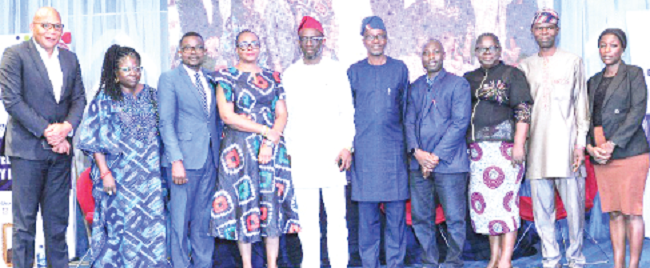A professor of Urban Development and Governance at the University of Lagos (UNILAG), Akoka, and the leader of the African Cities Research Consortium (ACRC), Taibat Lawanson, has presented the key findings of the multi-city research project carried out by her team on key sectors of socio-economic development of the city of Lagos.
She made the presentation during the 2023 edition of an annual education summit by the Education Writers’ Association of Nigeria (EWAN), a body of journalists reporting educational matters in Nigeria and beyond, revealing causes of, and providing solutions to seemingly intractable developmental challenges confronting the state.
The EWAN summit orgarnised to address key issues within and around the education sector with the sole purpose of bringing together relevant stakeholders to identify solutions and ensure proper implementation had ‘Research for National Development: Nigeria’s Internal Security in Focus,’ as its theme for the last edition held at Raddisson Blu, Ikeja, Lagos.
The keynote speaker at the event was the immediate past vice chancellor of the University of Lagos (UNILAG), Akoka, who is currently the chairman of Lagos State Research and Innovation Council (LASRIC), Professor Oluwatoyin Ogundipe.
The forum drew critical stakeholders from government, industries, and the academia including vice chancellors and rectors, and representatives of the civil society and the labour union.
Speaking about the research project entitled: ‘Lagos City of Systems: Food Security, Health and Safety, Environmental Sustainability, ’ Professor Lawanson noted the project, which is currently being undertaken across 12 African cities, “presents an opportunity for researchers and practitioners to work together to achieve a shared understanding of the political economy of African cities in order to identify and address the critical challenges the cities are facing.”
The don who listed some emerging findings in the Lagos city which she noted cut across nine city systems and four domains of the research focus as education, healthcare sector, transportation, water and sanitation, waste management, energy, food distribution, finance and ICT as well as law and order said the research offered recommendations to address obvious gaps.
She noted that the project’s aim is to generate insights and evidence that will help improve the living conditions, services and life chances of all city residents, particularly for disadvantaged communities.
She disclosed that “it is an investment by the Foreign, Commonwealth and Development Office (FCDO) of the United Kingdom, which is targeted at funding “new, operationally-relevant research to address intractable development challenges in African cities”.
According to Professor Lawanson, the project’s domains of interest in Lagos are structural transformation, education, safety and security, neighbourhood and economic district development and housing.
She hinted that the researchers who made up the consortium had been working over the last two years and have identified priority complex problems which she pledged would be addressed through action research and advocacy over the next five years.
According to her “All priority complex problems align with the Lagos State Economic Development Plan (2032 – 2052) and the THEMES+Agenda of the Lagos State Government,” she said.
On the healthcare sector, Professor Lawanson said the term “spatial injustice” refers to the city’s unequal distribution of health facilities and personnel, even as she said the distribution is skewed towards Lagos Island, a highbrow area.
She added that brain drain within the education and healthcare sector have led to an exodus of teachers and health workers from the state abroad, noting that the state’s paper-based record system made it difficult to get real-time disease surveillance systems in the city.
She advised the government to consider reconciling what she described as the position of “water as an economic good and the view of civil society of water as a social justice.”
“How can we recognise, upscale, and regulate the activities of local water and sanitation service providers? This is because unlocking the potential of those who work in the sector will catalyse improvement in that sector,” she added.
The professor said the research revealed that 50 per ent of waste generated in Lagos is food waste, noting that though the city has the longest history of organised solid waste management in Nigeria, “it has been unsuccessful with waste separation from source.”
“The research identified huge informal sector participation in the waste sector, though with recurrent prohibitions by official waste regulators, and found plastics and recyclable products as an emerging resource, largely driven by informal actors.”
To address the concerns around waste management, the researcher suggested “mainstreaming the process of informal waste worker formalisation, especially waste pickers, recyclers, dumpsite sorters, among others.”
Reviewing the recommendations after the presentation, a Professor of Environmental Law and former vice chancellor of Lagos State University (LASU), Olanrewaju Fagbohun, said apart from the fact that the report is comprehensive, it is captured in very simple language “and you have broken it down into the different sectors.”
He said as an outcome of empirical studies, the recommendations must be embraced by all, “particularly the state government.”
Reacting on behalf of the Lagos State Commissioner for Basic and Secondary Education, Jamiu Alli-Balogun, the Director of Education Resource Centre, Omolayo Akinlade, thanked the consortium for the efforts, and pledged the support of the state in the implementation of the recommendations.
“The administration of Governor Babajide Sanwo-Olu is is a listening one, and that is clearly evident in the passion and commitment towards achieving the T.H.E.M.E.S plus agenda, which have incorporated almost all the sectors touched in the research,” she said.
Mrs Akinlade said she would make the document available to the commissioner but pleaded with the organisers of the event- EWAN, to provide avenue for all the concerned ministries and agencies to have access to the recommendations.
The research consortium currently operates across 12 African cities of Lagos, Maiduguri in Nigeria; Accra (Ghana), Addis Ababa (Ethiopia), Kampala (Uganda), Dar es Salaam (Tanzania), Freetown (Sierra Leone), Mogadishu (Somalia), Nairobi (Kenya), Lilongwe (Malawi), and Bukavu in the Democratic Republic of Congo.
According to Mrs Lawanson, the consortium is tasked with rethinking approaches to urban policies and programming.






